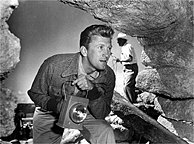The Atlantic on Arafat
The piece in the latest issue of The Atlantic on Yassir Arafat--In a Ruined Country: How Yasir Arafat Destroyed Palestine, by David Samuels-- is a must-read. I can't post a link -- it is available online only for subscribers -- but I suggest you go out and get it. The article is a thorough examination of Arafat that cuts through all the lies and spin that have been propagated over the years, particularly by the horror-show named Deborah Sontag of the NY Times.
Though couched in what might be described as Moonbat-speak, its reporting is thorough, particularly on such matters as Arafat's orchestration of the 2000 Intifada, his use of terrorism and bribery. It is, of course, no secret to anyone who has followed this story that Arafat started the Intifada. That's old news. However, for a MSM outlet -- one generally sympathetic to the Pals --- to recognize it is very important.
On the attitude of Europeans toward the creation of the Palestinian Authority, Samuels says this:
And this, on the intifada:
Tons of stuff like this--Arafat's corruption, his lies, and above all his use of terrorism. There's this insight:
An imporant story. Not perfect by any means, but overall, because of its dead-on portrayal of Arafat, a must-read.
Though couched in what might be described as Moonbat-speak, its reporting is thorough, particularly on such matters as Arafat's orchestration of the 2000 Intifada, his use of terrorism and bribery. It is, of course, no secret to anyone who has followed this story that Arafat started the Intifada. That's old news. However, for a MSM outlet -- one generally sympathetic to the Pals --- to recognize it is very important.
On the attitude of Europeans toward the creation of the Palestinian Authority, Samuels says this:
For the diplomats of the European Union, whose dream of creating a new kind of political organization that would rival the United States for global influence was burdened by the historical guilt of colonialism and the Holocaust, the image of the Jew as oppressor that Arafat offered the world was both novel and liberating; the State of Israel would become the Other of a utopian new world order that would be cleansed of destructive national, religious, and particularistic passions.
And this, on the intifada:
The second intifada also began with the intention of provoking the Israelis and subjecting them to diplomatic pressure. Only this time Arafat went for broke. As a member of the High Security Council of Fatah, the key decision-making and organizational body that dealt with military questions at the beginning of the intifada,[Mamduh]Nofal [former military commander of the Democratic Front for the Liberation of Palestine] has firsthand knowledge of Arafat's intentions and decisions during the months before and after Camp David. "He told us, 'Now we are going to the fight, so we must be ready,'" Nofal remembers. Nofal says that when Barak did not prevent Ariel Sharon from making his controversial visit to the plaza in front of al-Aqsa, the mosque that was built on the site of the ancient Jewish temples, Arafat said, "Okay, it's time to work."
Tons of stuff like this--Arafat's corruption, his lies, and above all his use of terrorism. There's this insight:
Absent the formal police-state structure that existed in Iraq and still exists in Syria, the reality of Palestinian social and political life under Arafat can best be described not as totalitarian but, rather, as an extreme kind of political narcissism, in which millions of people were reduced to tokens in the fantasy life of the man they had been educated to think of as their father.
An imporant story. Not perfect by any means, but overall, because of its dead-on portrayal of Arafat, a must-read.


<< Home